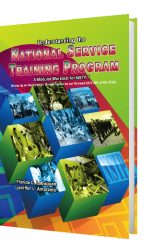
Authors: Florida C. Labuguen, Jennifer L. Amaranto
The need for preparing the youth for their duties as citizens via the National Service Training Program (NSTP) cannot be overemphasized.
As embodied in RepublicAct No. 9163, the NSTP Law of 2011 has ushered a new direction in training the Filipino youth for the duties and responsibilities of citizenship. This citizenship program purports to prepare the youth for their primordial tasks as nation-builders and citizen-soldiers in response to the clarion call of the times.
As an educational program and a curricular requirement, it is aimed at transforming the youth into productive assets for local and national development. Based on the findings from history that there are much to be expected from the intrinsic and potential value of the young Filipino, the Program is designed to develop knowledge, skills and values in order for them to become good citizens.
To attain the objectives of NSTP, this modular work-text attempts to present a comprehensive overview of the Program.
The whole gamut of insights and activities relative to NSTP contained in this work-text satisfies the need for instructional material that meets the prescribed guidelines for the implementation of RA 9163.
The student-trainees will find this modular work-text useful, relevant and responsive to the contemporary situation. The zealous and vibrant response of our youth to the realization of the ends of this Program will constitute a covenant in building sustainable communities in the country for national development.
It is with fervent hopes that the school officials and authorities mandated by law to operationalize this vital aspect of youth empowerment through citizenship education will optimally use this resource material in the delivery of subjects covered
on the first leg of part of NSTP, especially along the subjects of the 25-hour common module phase in pursuit of that ultimate end of moulding the young people into civic and defense-prepared individuals for nation building.
For comments and suggestions, please contact the Philippine Society of NSTP Educators and Implementers, Incorporated, through e-mail address: PSNEI_INC@ yahoo.com.ph.
An endeavor of this magnitude entails an enormous debt of gratitude.

Authors: Rogelio I. Espiritu, Maria Rosario E. Monce, Madeleine M. Co, Jayme C. Ignacio, Katherine C. Guevarra
With the aim of giving quality teaching and learning experience to teachers, students as well as other community developers, social workers and others doing extension and community services, this worktext is conceptualized and realized.
This hook is divided into two (2) parts:
Common Module — Enhancing Awareness to Social Issues and Problems; and
Specific Module — Developing Oneself Thru Community Involvement
At the end of each chapter are worksheets, which will be answered by the students. These will serve as a form of evaluation on the extent of learning they have gained from each chapter.
This hook hopes to fulfill the objectives of the National Service Training Program (NSTP); i.e., to bring back the awareness of students as well as mentors of various traits and values, namely: civic responsibility, patriotism, leadership, assertiveness, concern for people and environment and lastly, to be an active mobilizer of the community working together to solve problems and issues confronting them.

Authors: Arnold L. Espinas, Propecasio D. Dalangin, Miguel R. Santos, Marilyn T. de Jesus
This reference text is a result of a long search for the appropriate materials for the Civic Welfare Training Service (CWTS). One of the principal aims of the NSTP is to instill in the minds of the young Filipinos the culture of volunteerism. But developing a high sense of volunteerism is not enough to make the young citizens become effective agents of development. In order to become an effective community worker, each student of CWTS must possess not only the ability to identify the problems of a community. He must also exhibit the ability to understand causes and effects of those problems which will provide great help in formulating the kind of intervention needed to confront them.
The task of student community workers is not easy, especially on the part of those still in the process of gaining accurate perspective of the dynamics of the community. Each community is characterized by various complexities of sociocultural realities. That is indeed the reason why the authors believe that there can never be one written material capable of providing complete answers to the issues of even one community. But even so, this reference text hopes to share relevant information that will encourage young individuals to become empowered members of the society to which they belong. Empowerment would mean being always ready to initiate actions instead of just being plain participants in any community building efforts.
Copyright © Mutya Publishing House, Inc. All Rights Reserved, 2020
